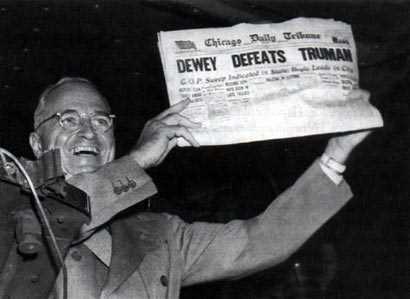In a sensational discourse to a joint session of Congress, President Harry S. Truman requests U.S. help for Greece and Turkey to thwart socialist mastery of the two countries. Students of history have frequently refered to Truman's address, which came to be known as the Truman Doctrine, as the official announcement of the Cold War.

In February 1947, the British government educated the United States that it could never again outfit the financial and military help it had been giving to Greece and Turkey since the finish of World War II. The Truman organization trusted that the two countries were undermined by socialism and it seized the opportunity to take an extreme position against the Soviet Union. In Greece, radical powers had been doing combating the Greek regal government since the finish of World War II. In Turkey, the Soviets were requesting some way of control over the Dardanelles, region from which Turkey could command the vital conduit from the Black Sea to the Mediterranean.
On March 12, 1947, Truman showed up before a joint session of Congress to present his defense. The world, he pronounced, confronted a decision in the years to come. Countries could receive a lifestyle "in view of the will of the greater part" and governments that gave "certifications of individual freedom" or they could confront a lifestyle "in view of the will of a minority coercively forced upon the lion's share." This last administration, he demonstrated, depended upon "dread and persecution." "The outside strategy and the national security of this nation," he asserted, were associated with the circumstances going up against Greece and Turkey. Greece, he contended, was "undermined by the psychological militant exercises of a few thousand outfitted men, drove by communists." It was occupant upon the United States to help Greece with the goal that it could "turn into a self-supporting and self-regarding majority rules system." The "opportunity cherishing" individuals of Turkey additionally required U.S. help, which was "fundamental for the upkeep of its national uprightness." The president pronounced that "it must be the arrangement of the United States to help free people groups who are opposing endeavored oppression by furnished minorities or by outside weights." Truman asked for $400 million in help for the two countries. Congress affirmed his demand two months after the fact.
The Truman Doctrine was a true revelation of the Cold War. Truman's address laid out the expansive parameters of U.S. Icy War remote arrangement: the Soviet Union was the focal point of all comrade action and developments all through the world; socialism could assault through outside intrusion or inward subversion; and the United States expected to give military and financial help to shield countries from comrade animosity.
Not every person grasped Truman's rationale. Some understood that the revolt in Greece was bolstered not by the Soviet Union, but rather by Yugoslavia's Tito, who broke with the Soviet communists inside a year. Also, the Soviets were not requesting control of the Dardanelles, but rather just confirmations that this vital conduit would not be utilized by Russia's adversaries as the Nazis had utilized it amid World War II. What's more, regardless of whether U.S. help would bring about popular government in Greece or Turkey was hazy. Undoubtedly, the two countries set up abusive conservative administrations in the years following the Truman Doctrine. However, the Truman Doctrine effectively persuaded numerous that the United States was secured a desperate battle with the Soviet Union, and it set the rules for more than 40 long periods of U.S.- Soviet relations.
"Cheers"